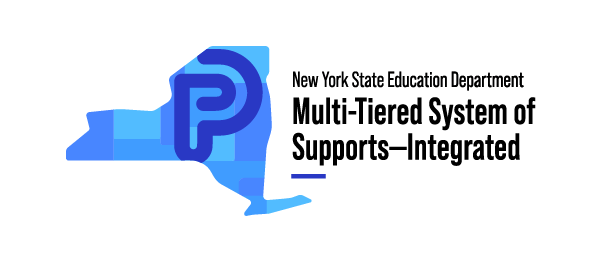MTSS-I Virtual Learning Summit 2025
From Blueprint to Success: Practical Approaches to Implementation
August 13-14, 2025
This event occurred in the past. Access conference materials and presentation recordings below.
Sponsors:




Session Recordings: Day 1
Main Room: DAY 1Breakout Room: The District Leadership Team (DLT) – School Leadership Team (SLT) Cycle: Implementation Science as the Glue
Session Recordings: Day 2
Main Room: DAY 2Breakout Room: Elevating Family Voices in MTSS: Strategies for Inclusion and Engagement
Schedule
| Time | Sessions: Day 1 |
|---|---|
|
8:30 - 8:45 AM
|
Welcome AddressPresented by Elisa Alvarez, MS, MSEd, Associate Commissioner Office of Bilingual Education and World Languages, NYSED Introduced by Stacy A. S. Williams, PhD, LP, NYSED MTSS-I Director |
| 8:45 - 9:55 AM |
KEYNOTE
Creating Enabling Conditions for Multi-tiered System of Supports (MTSS) ImplementationPresented by Caryn Sabourin Ward, PhD, Co-Director, National Technical Assistance Center, United States Department of Education Teaching and learning keep evolving and changing to meet the needs of new student generations. As our practice evolves, the systems and processes supporting them need to evolve and change as well. However, our systems often lag in change. How can we as leaders create the enabling conditions and systemic change needed to support our educators evolving practice to obtain equitable outcomes for our students? We will strive to answer this question using implementation science and provide practical actions teams can apply to support MTSS implementation within their local context. |
| 10:00 - 10:50 AM |
CONTENT SESSION 1
MTSS-I Sustainability Practices: Creating Systems that EndurePresented by Rodrigo Campos, PsyD, MTSS-I Coach Frequent changes in school or district leadership are a reality in education, but well-designed systems and structures can outlast these transitions. In this session, we will explore how to establish and sustain MTSS policies that remain effective despite leadership changes. Drawing on proven models from districts across the country, participants will learn best practices for building policies that are data-driven, community-focused, and resilient. Attendees will also gain practical tools and strategies to address common challenges, ensuring that their MTSS framework remains a cornerstone of evidence-based instruction and intervention, and continuity in their schools, regardless of leadership shifts. This session is designed for school leaders and district staff looking to create enduring, adaptable systems that support all students. CONTENT SESSION 2The District Leadership Team (DLT) - School Leadership Team (SLT) Cycle: Implementation Science as The GluePresented by Daniel Carroll, MS, CAS, MTSS-I Coach Teaming structures are among the primary, foundational features of the body of research known as implementation science, and New York State Education Department’s (NYSED's) Pilot MTSS-I Framework centers the implementation of MTSS-I around two specific implementation teams-DLT and the SLT. In this practical and engaging session, we will explore how implementation science's key features are baked into NYSED's Pilot MTSS-I Framework and its guidance for establishing effective DLTs and SLTs. Participants will learn how to effectively integrate the ongoing work of the DLTs and SLTs within a cyclical feedback loop that is fueled by iterative cycles of cohesive data. |
| 11:00 - 11:50 AM |
PRACTITIONER SESSION: District Highlight - Lackawanna City School District
Data-Driven Solutions for Empowering MTSS-I SuccessFacilitated by Renee Beaulieu, CAS, MTSS-I Coach Panelists: Julie Andreozzi; Amy Godzich, MSEd; Ashli Krotz, MSEd; Alina Taylor, MSEd; and Kelly Vicaretti, MSEd Is implementing Tier 1—especially classroom-level data—challenging due to time constraints? Are you encountering barriers in developing Tier 2 supports and looking for practical strategies to overcome them? Join the dedicated teachers and counselor from Martin Road Elementary in the Lackawanna City School District as they share their journey of strengthening Tier 2 practices. Learn how they built a solid foundation using consistent Tier 1 general education classroom data to inform and support Tier 2 implementation. |
| 12:00 - 12:30 PM | Lunch Break |
| 12:40 - 1:30 PM |
KEYNOTE
The Architecture of Coaching: Building Strong Foundations to Support CoachingPresented by Sophia Farmer, MT, Implementation Specialist, Response to Intervention (RTI) Center for Education Evaluation and Research You can be the architect of a robust coaching system that transforms the potential of coaching into practice. In this presentation, participants will learn how to build a system that empowers coaches to deliver consistent, impactful support to implement key initiatives. We’ll explore essential tools and best practices to create consistency, success and foster continuous growth. |
| 1:40 - 2:30 PM |
CONTENT SESSION
The Long View: Case Studies and Positive Outcomes in Districts that have Embraced Family EngagementPresented by Fiona Rattray, BA, PGCE, Family Engagement Coordinator, Starbridge and Kari Powers, MS, Family Engagement Specialist and Information Specialist, Starbridge This evidence-based session will consider tangible data collected from districts that have committed to engaging their families. Attendees will explore outcomes in a range of schools focused on increasing family engagement as a strategy to improve student success. The session will also include case studies so that attendees can engage in examining and identifying strategies or approaches that may work in differing scenarios. |
| 2:40 - 3:30 PM |
PRACTITIONER SESSION
Lessons Learned from Initially Installing MTSS-I SystemsFacilitated by Steve Rappleyea, PsyD, MTSS-I Coach Panelists: Kate Dorgan, MS; Jennifer Mahar, MEd; Keri Rosher, MSEd, SBL; and Christopher G. Wojeski, MEd, MEd, EdD Launching a MTSS-I is a complex but critical step toward improving outcomes for all students. In this session, school and district leaders will reflect on the realities of initial MTSS-I installation—sharing challenges faced, lessons learned, and strategies that helped build momentum from the ground up. Panelists will explore how they gained staff buy-in, balanced academic and behavioral supports, leveraged leadership and partnerships, and used early data to guide implementation. Participants will hear honest reflections about what they wish they had known at the start and what they would do differently if given the chance. This session offers valuable insights for educators at any stage of MTSS-I implementation who want to learn from those who have walked the path before. |
| 3:30 - 4:00 PM |
Wrap Up & Evaluation Day 1 |
| Time | Sessions: Day 2 |
|---|---|
| 8:30 - 8:45 AM |
Welcome AddressPresented by Anael Alston, EdD, Assistant Commissioner Office of Access, Equity, and Community Engagement Services Introduced by Stacy A. S. Williams, PhD, LP, NYSED MTSS-I Director |
| 8:45 - 9:55 AM |
KEYNOTE
Ensuring Access, Building Ownership for English as a New Language (ENL) Students with Diverse Needs in MTSS-IPresented by Claudia Rinaldi, PhD, Chair of Undergraduate Education, Lasell University This session will address how MTSS can support MLL students across all tiers of instruction, screening and progress monitoring. This session will provide recommendations and practical application of collaboration structures, representation, and optimization of MLL supports across general and special education. Finally, we will provide guidance on the role of the student support process or pre-referral for MLLs. |
| 10:00 - 10:50 AM |
CONTENT SESSION 1
Bridging Data and PracticeMeredith Rivet, MS, CAS, MTSS-I Coach This professional development session empowers educators and leaders to leverage data to improve reading outcomes. Participants will explore strategies to interpret and utilize data at both the system and classroom levels to design targeted, effective reading instruction. The session covers key components such as analyzing assessment data, aligning instruction with student needs, monitoring progress, and fostering collaboration among teachers and administrators. CONTENT SESSION 2Elevating Family Voices in MTSS: Strategies for Inclusion and EngagementPresented by Julianne Toce, MS, Senior Manager for Training and Development, INCLUDEnyc and Michael Verini, MS, Family Engagement Training Specialist, INCLUDEnyc This interactive session focuses on elevating family voices within NYSED’s MTSS-I Pilot Framework. Attendees will explore the integral role families play in enhancing positive outcomes for students, and learn practical strategies for effectively including families on implementation teams. Additionally, the session will cover innovative methods for engaging families and including their input when direct participation is not possible, ensuring that all voices are heard. |
| 11:00 - 11:50 AM |
PRACTITIONER SESSION: District Highlight - West Islip Union Free School District
From Vision to Action: How West Islip is Driving MTSSFacilitated by Rodrigo Campos, PsyD, MTSS-I Coach Panelists: Rhonda Pratt, Dana Musso, MSEd Discover how West Islip is using MTSS fidelity tools to strengthen schoolwide literacy instruction and interventions. This session highlights how the district is building a unified vision for literacy instruction and how one elementary school brings that vision to life through grade-level implementation plans, collaborative teams, and targeted Tier 1 practices to improve student outcomes. |
| 12:00 - 12:30 PM | Lunch Break |
| 12:40 - 1:30 PM |
CONTENT SESSION
Implementing Tier 1 Behavioral Supports with Fidelity to Leverage Success for All StudentsPresented by Shawna Belanger, PhD, Associate, Technical Assistance Partnership for Behavior (TAP-B) and Alyssa Rodriguez, MS, CAS, NCSP Graduate Assistant (TAP-B) In this session, participants will learn how the empirically supported components of the NYSED’s MTSS-I Pilot Framework, Tier 1 Behavioral Supports, form an equitable foundation that emphasizes structuring the educational environment to increase academic engagement while reducing the need for exclusionary discipline practices. |
| 1:40 - 2:30 PM |
CONTENT SESSION
Mastering Tier 1 Instruction: The Art of Designing a Well-Crafted LessonPresented by Renee Beaulieu, CAS, MTSS-I Coach In this session, participants will explore the essential components of creating highly engaging lessons that not only captivate students' attention but also seamlessly integrate social emotional learning (SEL) and behavior expectations. Participants will learn how to embed SEL and behavior goals into each lesson through clear, actionable learning objectives. By the end of the session, participants will leave equipped with strategies to enhance student engagement, promote positive behaviors, and foster emotional development, all while delivering rigorous and meaningful instruction. |
| 2:40 - 3:30 PM |
PRACTITIONER SESSION
Practices to Support SustainabilityFacilitated by Steve Rappleyea, PsyD, MTSS-I Coach Panelists: Stanley Ekiyor, EdD, BCBA, LBA; Ellen Gerace, LCSW, CAS; Nicolle Haynes, MS, MSL, MEd; and Colleen Tyler, MS Sustaining a MTSS-I requires more than initial implementation—it demands long-term vision, strategic alignment, and a culture of continuous improvement. In this session, panelists will share concrete practices and lessons learned from building and maintaining sustainable MTSS-I frameworks in their schools. Topics will include strategies for maintaining staff engagement, leveraging data for decision-making, ensuring equity in interventions, and integrating social-emotional learning and mental health supports. Participants will hear real-world examples of how schools have successfully sustained academic and behavioral supports over time, and gain practical insights to overcome common challenges. Whether you're refining an existing system or looking to strengthen sustainability, this session offers actionable ideas to help keep MTSS-I efforts thriving. |
| 3:30 - 4:00 PM |
Wrap Up & Evaluation Day 2 |